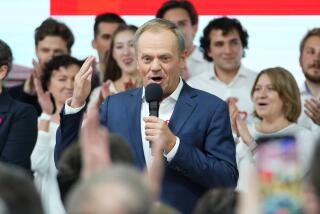Now, the Tough Transition : Czechoslovakia: The suppression of normal politics for 40 years makes it difficult to reconstruct alternatives of choice, let alone a governing coalition.
- Share via
OXFORD, England — With each turn, the wheel of revolutionary change in Eastern Europe seems to revolve faster. In a fortnight, opposition groups in Prague have made gains--the dethronement of the Communist Party from its constitutional leading role, the concession of coalition government and free elections--that their counterparts in East Berlin have not yet fully secured and their colleagues in Warsaw and Budapest took months to achieve.
Yet everywhere, making the transition to democracy will be more difficult than breaking the Communist power monopoly. In Czechoslovakia, as elsewhere in Eastern Europe, the systematic suppression of normal politics for more than 40 years makes it very difficult to reconstruct a choice of organized political alternatives, let alone build a viable governing coalition.
The main coordinator of protest in Czechoslovakia, the Civic Forum, is an umbrella network of disparate groups united in their opposition to the current regime. Its spokesmen see themselves realistically as reluctant amateurs pressed into political service by extraordinary circumstances. Some, like playwright Vaclav Havel, may eventually accept symbolic high office; most will go back to their literary, intellectual and college careers. The Forum itself may give rise to a new democratic movement that will become part of a spectrum of organizations including existing and reshaped parties.
The small non-Communist parties that have eked out an existence as cosmetic partners in the Communist-led National Front may become serious alternatives. The two Christian-oriented, rural-based parties have considerable potential for growth, as they can draw upon an increasingly active Catholic population, especially in Slovakia. The Czech Socialist Party possibly has a larger political role to play. Its daily paper Svobodne Slovo (Free Word) has for some time been quite outspoken, and some of the party’s leaders have joined the student and intellectual opposition in calling for mass Communist Party resignations. The Socialist Party is likely to experience a rapid influx of members, as occurred in 1968, though now as then it will face competition from a revived Social Democratic movement. As in 1968, so now the Social Democrats are likely also to present competition to reform communism.
Reform communism will form a key part of the new political spectrum. The present Communist Party will probably split, producing a conservative faction and a large reformist group based on the
“shadow party”--the half-million members purged in the aftermath of 1968 and now starting to re-enter Communist ranks. Some of its leaders, including Jiri Hajek, formed the Renewal group earlier this year; others, like Zdenek Mlynar, have returned from exile. Headed by Alexander Dubcek, they represent a group with unquestioned political experience and some moral credibility yet by no means a buoyant long-term future.
The reformist policies that Dubcek still cherishes, centered on socialism with a human face led by a more “open” Communist Party, have surely been overtaken by events. Few in Czechoslovakia today believe in an improved Communist Party-led system; most want a democratic one offering free political choice. The watchwords are freedom and democracy, harking back to traditions of the First Republic, the only regime in Eastern Europe to sustain democracy through the interwar period.
The coalition governments of the interwar and even the early postwar period, when the Communists shared power, provide a more useful model for the future then does 1968. A reformed Communist Party, with policies that go beyond 1968, could at most provide a political bridge in the coalition that manages the transition from the ruins of Communist dictatorship to the beginnings of multiparty democracy.
Managing that transition will be far from easy. Recriminations over the past will inevitably accompany the beginnings of democratization. What will be needed is a government of national unity based on a balanced coalition embracing Socialists and Christians as well as reform Communists, and Slovak groups as well as Czech. Past antagonisms, the scarcity of experienced politicians and the volatility that follows the overthrow of an established dictatorship will mean that this process will take much effort and time.
But more political time and more stable conditions may be available in Czechoslovakia than in Poland, Hungary or East Germany, since the economic situation is less pressing and the population less polarized and impatient. Relative economic prosperity and traditional political moderation, the very factors that delayed the outburst of protest and made Czechoslovakia the last key country in East-Central Europe to challenge its Communist rulers, may now help it to complete the transition to democracy and a mixed economy more rapidly and ultimately more successfully.
More to Read
Sign up for Essential California
The most important California stories and recommendations in your inbox every morning.
You may occasionally receive promotional content from the Los Angeles Times.










